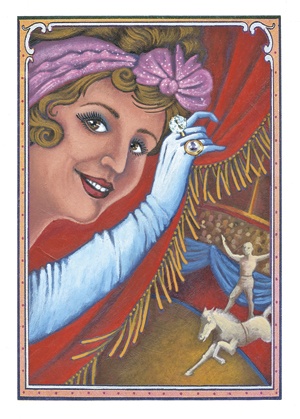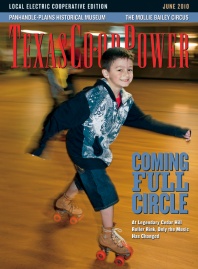Aunt Mollie” Bailey stood at the entrance of the circus tent before each performance to welcome her guests to the Mollie A. Bailey Show. Diamonds sparkled on each of her fingers. A round little woman with a poufy hairstyle, small waist and magnificent clothes, Mollie possessed enough talent to fill a big top. She sang, she danced, she played the piano, and she managed every aspect of her circus down to the smallest detail. Mollie’s soft heart tempered her strong, independent personality. All Civil War veterans got in free. So did children whose families could not afford the price of a ticket.
Born in 1844, according to most sources, on a large southern plantation in Alabama, Mollie Arline Kirkland defied her wealthy parents when she married Gus Bailey, a bandleader and talented musician, whose father owned a circus. Gus Bailey captured Mollie’s heart when she was just 14. The lure of his red hair and romantic lifestyle were too much for Mollie to resist. When she married Gus, her enraged father disowned her and never spoke to her again.
Circus life suited Mollie, and the couple soon set out on their own as the Bailey Family Troupe, putting on plays and musicals. But the Civil War intervened, and Gus enlisted in the Confederate Army in 1861. In 1862, he was assigned to a regiment in Hood’s Texas Brigade. There, he directed the band and performed with a group called Hood’s Minstrels between battles.
Unwilling to be left behind, Mollie went along to serve as a nurse in the field hospital. She entertained the troops, cooked hot meals and tended wounds. Much to the amazement of Gen. John Bell Hood, Mollie once dressed as an old woman, painted lines on her face with makeup, and, summoning all her acting skills, hobbled through the enemy camp leaning on a cane and selling cookies. The soldiers hardly noticed her as she picked up bits of vital information to pass along to the Confederates.
News that her husband’s regiment was desperately in need of medicine prompted Mollie to take on still another role to aid the South. She asked army surgeons to pack medicine into small packets that she hid in her intricate, curled pompadour hairstyle. Successfully passing through the Union lines, she made her way alone to deliver the medicine to suffering Confederate soldiers.
Like nearly everyone in the South, the Baileys were destitute at the end of the Civil War. In 1867, they rented a boat and performed up and down the Mississippi River, but Mollie lived in constant fear that one of her three children would fall overboard and drown. Trading the boat to a farmer for a wagon and a team of mules, the Bailey Family Troupe hit the road again. Business blossomed, and more Bailey children arrived, eventually reaching a total of nine. As they grew older, the children took their own roles in the show.
In 1879, the Baileys billed their circus as “A Texas Show for Texas People” and made the Lone Star State their home.
During the last half of the 19th century, the arrival of what had become known as the Mollie A. Bailey Show brought rare excitement to small towns. As the years passed, the circus grew to include 31 wagons and about 200 animals. Nearly all the performers were members of Mollie’s family, and each played many roles in the performances. Many of the circus animals walked from one town to the next following the wagons. When an elephant broke through the rickety bridge over the San Jacinto River near Willis, the whole town turned out to offer advice on how to get him back on his feet.
Mollie managed all circus details after Gus’ death in 1896, but when she fell and broke her hip in 1918, none of her children had developed the organizational skills needed to keep the circus going. The broken hip refused to heal, and Mollie Bailey died in Houston a few months later. Within two years, the circus folded.
The popularity of the Mollie A. Bailey Show in small towns throughout the South is reflected in these lines from a poem by Frank W. Ford:
“It was cotton-picking time down in Texas
And the leaves of all the trees a golden brown.
The children and the old folk all were happy
For The Mollie Bailey Show had come to town.”
——————–
Martha Deeringer is a frequent contributor to Texas Co-op Power.


